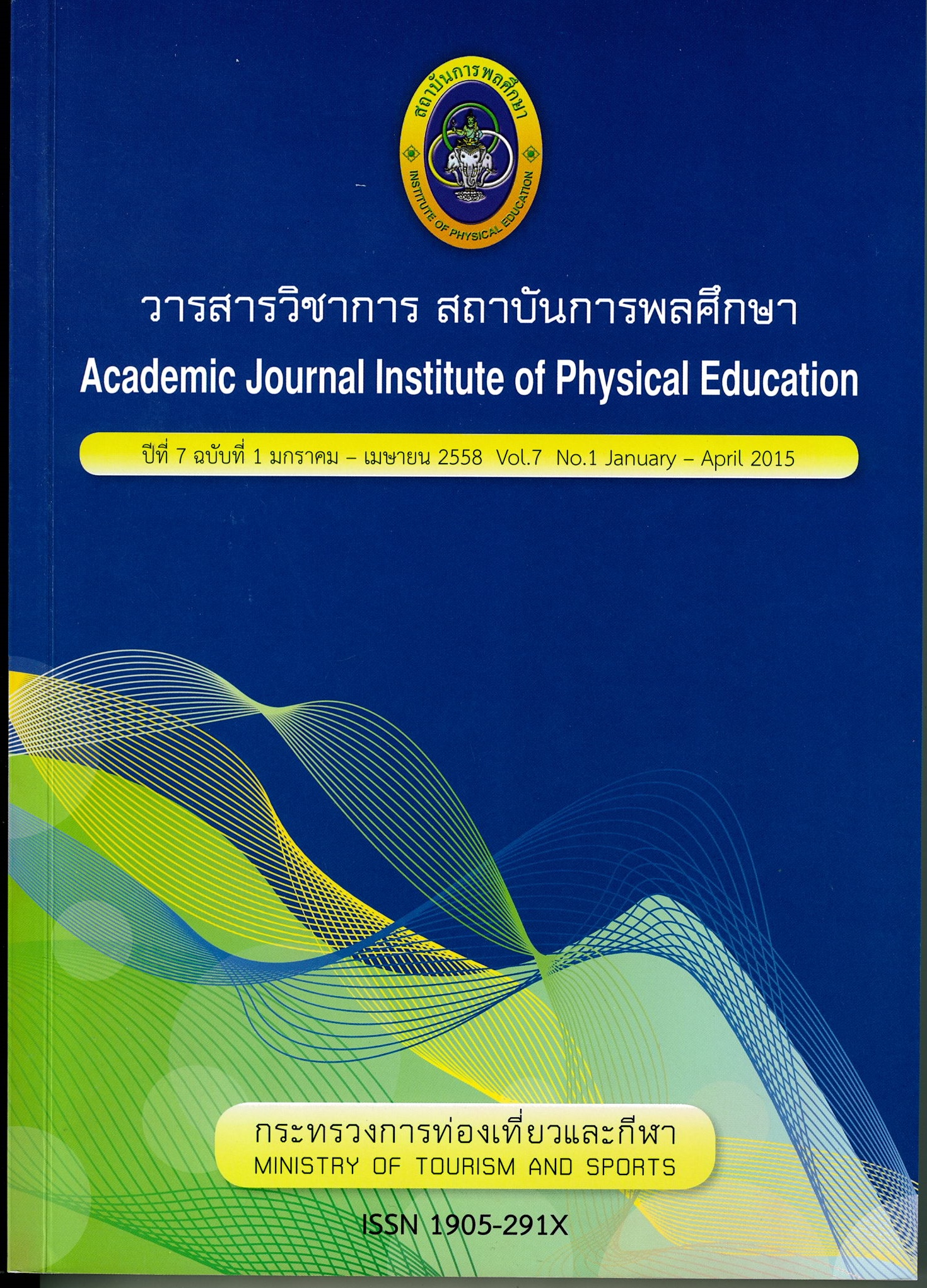An Information Model for Supporting Cultural Tourism Through the Participation of Mekong River Basin Communities
Main Article Content
Abstract
The objectives of this research were to determine (1) the cultural contexts, traditions, and lifestyles for tourism and (2) the need for an information model to develop cultural tourism in Wiang Sub-district, Chiang Khong District, Chiangrai Province. The sample group in this study was composed of 110 Thai and foreign tourists visiting Chiang Khong District. The participants for the focus group discussions were selected by the purposive sampling method, consisting of 15 stakeholders in tourism in the area. The tools used were questionnaires on “Factors Affecting the Need of Using an Information Model to Support Cultural Tourism by Mekong River Basin Communities” and topics for focus group discussions which emphasized the guidelines to develop an information model for cultural tourism. The data from the questionnaires was analyzed by percentages, means, and standard deviations; which were then presented in tables with a descriptive essay. The data collected from focus group discussions was analyzed by content analysis method and presented by a descriptive essay.
The findings have shown that Chiang Khong District has the potential of tourist attractions which can be developed into a quality tourism destination to accommodate tourists. According to the concept of the readiness for tourism (3A's); (1) Attraction
(2) Accessibility (3) Amenities, these included the roads along
Khon Pi Luang, Pha Phra, hot springs, Haad Hin Ngam, Huai Meng Waterfall, and significant cultural tourist attractions such as Tai Lue villages, Tai Lue's Kathina Robe-Offering Ceremony, Wat Phra Kaew, Wat Luang, The Mekong Giant Catfish Ceremony, and The Eat New Rice Ceremony of the Hmong. An appropriate information model to support cultural tourism through the participation of Mekong River Basin Communities would be a map providing details of tourism in the district and a "one stop service” which could provide all the information to meet tourists' needs. The information would include tourism routes, accommodations, restaurants, and costs respectively.
Article Details

This work is licensed under a Creative Commons Attribution-NonCommercial-NoDerivatives 4.0 International License.
The published article is a copyright of the Academic Journal of Thailand National Sports University. The passage appeared in each article in this academic journal is a perspective of each author which is not related to the journal. Each author is required to be responsible for all components of his/her own article. If there are any mistakes, each author must be responsible for those mistakes on his/her own.
References
กระทรวงการท่องเที่ยวและกีฬา. (2553). สรุปสถานการณ์นักท่องเที่ยวระหว่าง ประเทศ ปี 2548 - 2553. สืบค้นเมื่อ 25 กุมภาพันธ์ 2553, จาก http://tourism.go.th/2010/upload/news/files/สรุปสถานการณ์นักท่องเที่ยวระหว่างประเทศ
เกศฉราภรณ์ สัตยาชัย. (2546). ความพึงพอใจของประชาชนที่มีต่อการให้บริการแบบจุดเดียวเบ็ดเสร็จ (One Stop Service) ของสํานักงานเขต กรุงเทพมหานคร, ศิลปศาสตรมหาบัณฑิต มหาวิทยาลัยเกษตรศาสตร์.
ตุ้ย ชุมสาย, ม.ล.และญิบพันธ์ พรหมโยธี. (2527), ปฐมบทแห่งชีวิตการท่องเที่ยว, กรุงเทพฯ : ไทยวัฒนาพานิช.
ฤทธิชัย เตชะมหัทธันท์. (2548), สารสนเทศการท่องเที่ยว, สารนิเทศ, 12,(1-2), หน้า 28-29.
ธนกฤต สังข์เฉย. (2550), อุตสาหกรรมการท่องเที่ยวและการบริการ. กรุงเทพฯ: โรงพิมพ์ มหาวิทยาลัยศิลปากร.
นิคม จารุมณ. (2544), การท่องเที่ยวและการจัดการอุตสาหกรรมการท่องเที่ยว, กรุงเทพฯ: โอ.เอส. พริ้นติ้งเฮาส.
บุญหลิบ พานิชชาติและคณะ. (2544). ความรู้เบื้องต้นเกี่ยวกับอุตสาหกรรมท่องเที่ยว, มหาวิทยาลัยสุโขทัยธรรมาธิราช.นนทบุรี.
บุญเลิศ จิตตั้งวัฒนา. (2548). การจัดการท่องเที่ยวและอุตสาหกรรมการท่องเที่ยว, กรุงเทพฯ: เพรส แอนด์ ดีไซน์,
ประพัทธ์ชัย ไชยนอก. (2553). แนวทางการพัฒนาการท่องเที่ยวเชิงวัฒนธรรม: กรณีศึกษาบ้านด่านซ้าย อําเภอด่านซ้าย จังหวัดเลย ปริญญาศิลปศาสตรมหาบัณฑิต สาขาวิชายุทธศาสตร์การพัฒนา มหาวิทยาลัยราชภัฏเลย.
ภรณ์ทิพย์ สุพร สุพรรษา รากรักษ์ และ ปริวรรต สมนึก. (2556). แนวทางการจัดตั้งศูนย์บริการข้อมูลการท่องเที่ยวแบบครบวงจรของจังหวัดนครพนม. วารสารมนุษยศาสตร์และสังคมศาสตร์,4 (1), 67-89.
มนัส สุวรรณ และคณะ. (2541) โครงการศึกษาแนวทางการบริหารและการจัดการท่องเที่ยวในพื้นที่รับผิดชอบขององค์การบริหารส่วนตําบล (อบต.) และสภาตําบล (สต.). เสนอต่อการท่องเที่ยว แห่งประเทศไทย โดยโครงการศึกษาวิจัยการจัดการมนุษย์กับสิ่งแวดล้อมบัณฑิตวิทยาลัย มหาวิทยาลัยเชียงใหม่ และสถาบันดํารงราชานุภาพ สํานักงานปลัดกระทรวงมหาดไทย.
วลัยพร ริ้วตระกูลไพบูลย์. (2551). พฤติกรรมการท่องเที่ยวภายในประเทศของนักศึกษามหาวิทยาลัยเอกชนในเขตกรุงเทพมหานคร. วารสารการบริการและการท่องเที่ยว, 3(1), 27-29.
วันรักษ์ มิ่งมณีนาคิน. (2531) การพัฒนาชนบทไทย. กรุงเทพมหานคร: โรงพิมพ์มหาวิทยาลัยธรรมศาสตร์.
ศิริลักษณ์ โรจนกิจอํานวย, ปีเตอร์ รักธรรม, ลัดดาวัลย์ แก้วกิติพงษ์. (2553). การจัดกลุ่มความก้าวหน้าธุรกิจอิเล็กทรอนิกส์ของ การท่องเที่ยวไทย (Thai E-tourism business progression classification) ศูนย์วิจัยธุรกิจ คณะพาณิชยศาสตร์และการบัญชี มหาวิทยาลัยธรรมศาสตร์,
สุวรรณชัย ฤทธิรักษ์ และมานิตย์ ศุทธสกุล. (2544). ปัจจัยที่มีผลกระทบต่ออุตสาหกรรมท่องเที่ยว. ในเอกสารการสอนชุดวิชาความรู้เบื้องต้นเกี่ยวกับอุตสาหกรรมท่องเที่ยว หน่วยที่ 6 นนทบุรี สํานักพิมพ์หาวิทยาลัยสุโขทัยธรรมาธิราช.


